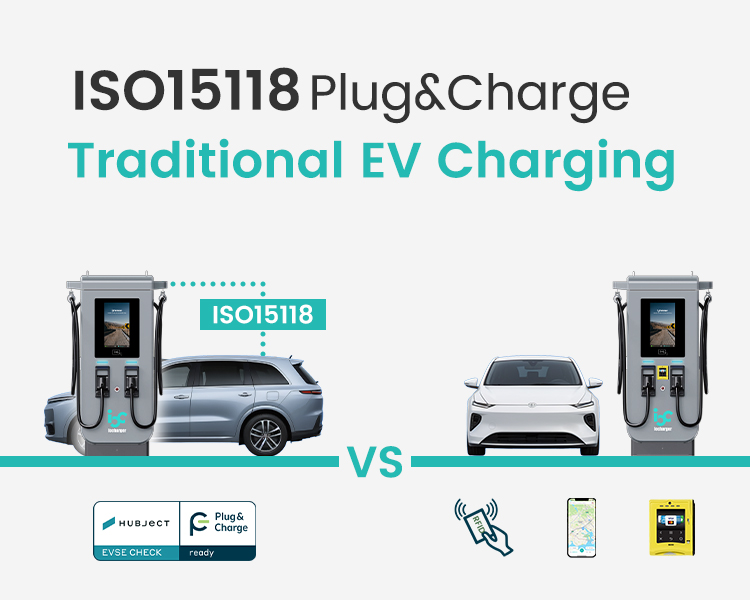
Have you ever wondered how ISO15118 Plug&Charge (PnC) technology is revolutionizing the EV charging experience? By offering a seamless and user-friendly alternative to traditional methods, PnC is set to redefine convenience and efficiency for EV drivers. Let’s explore the key differences between ISO15118 Plug&Charge vs. traditional EV charging, and discover how this innovation is shaping the future of electric mobility.
Authentication and Authorization:
- Traditional EV Charging: Starting a charging session usually requires manual steps like swiping an RFID card, using a mobile app, or entering payment details.
- Plug&Charge (ISO15118): With ISO15118, your EV automatically identifies and authorizes itself when connected to a compatible charging station. This streamlined process eliminates manual intervention, enhancing user convenience.
Security:
- Traditional EV Charging: Manual authentication methods can be vulnerable to security issues like lost or stolen RFID cards.
- Plug&Charge: ISO15118 uses advanced cryptographic techniques to establish a secure communication channel between the EV and the charging station, significantly enhancing data security and reducing the risk of unauthorized access.
User Experience:
- Traditional EV Charging: The process can involve multiple steps and vary across different networks, potentially leading to a fragmented experience.
- Plug&Charge: ISO15118 offers a simplified experience where drivers simply plug in their vehicles, and the system automatically handles authentication and billing, eliminating the need for physical cards or mobile apps.
Compatibility and Infrastructure:
- Traditional EV Charging: Widely supported across various vehicles and charging stations, requiring minimal infrastructure upgrades.
- Plug&Charge: Requires both the EV and the charging station to support the ISO15118 standard. While adoption is increasing, not all existing infrastructure is currently compatible, necessitating updates or replacements to support this technology.
Implementation Complexity and Cost:
- Traditional EV Charging: Generally involves lower implementation costs and comple existing authentication methods and infrastructure.
- Plug&Charge: Involves higher initial implementation costs due to the need for advanced infrastructure and support for ISO 15118. However, it offers long-term benefits in terms of user convenience and security.
At iocharger, we’re leading the charge in this technological evolution. Our range of commercial EV chargers, including the OCPP 1.6J & OCPP 2.0.1 7kW-22kW AC & 30kW-420kW DC EV charging stations, is designed to support the ISO 15118 standard, ensuring a seamless and secure charging experience for our users.
ISO15118 Plug&Charge is set to revolutionize the EV charging experience by making it more automated and secure. The seamless experience it offers could make it the future of EV charging.
For more insights into EV charging solutions and the latest industry trends, feel free to contact us at sales@iocharger.com.
